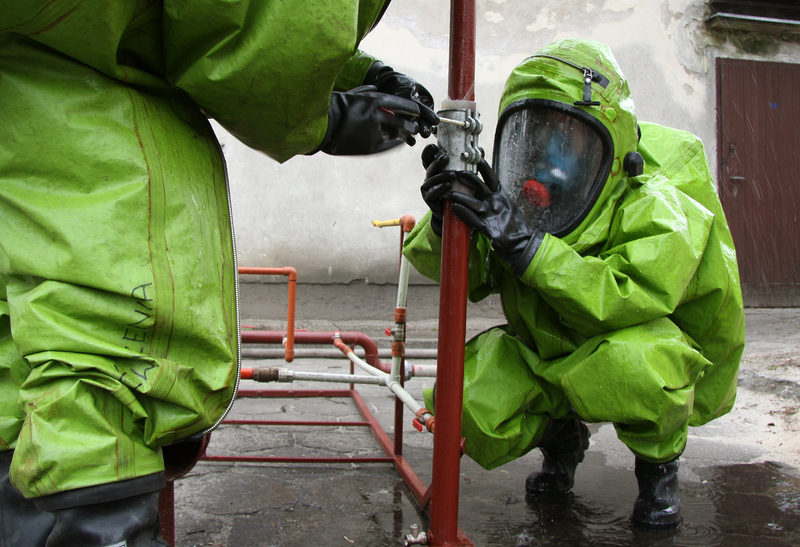Mr Adriaan van der Meer and Tristan Simonart from the Centres of Excellence (COE) at the European Commission outline the importance of lessening CBRN threats throughout Europe
“CBRN” stands for chemical, biological, radiological and nuclear (risk mitigation). The origin of these risks can be criminal (proliferation, theft, sabotage and illicit trafficking), accidental (industrial catastrophes, in particular chemical or nuclear, waste treatment and transport) or natural (pandemics but also consequence of natural hazards on CBRN material and facilities).
How important is it to ensure Europe is safe from CBRN risks?
When it relates to security culture and security governance, when one looks at the globalisation of emerging threats, with more than 40 open conflicts in the world, so many destabilised regions and displaced populations, increased biological threats as dramatically evidenced by Ebola crisis, or chemical or radiological contaminations, cross-border trafficking or industrial accidents, time is not for business as usual. CBRN risks in particularly are interconnected, complex and ignore frontiers. The response must, therefore, be comprehensive and based on a coherent set of actions combining local, regional and international cooperation.
How is the European Commission committed to tackling and reducing the risk of CBRN with an external origin?
On CBRN risk mitigation, as a matter of new international priority, the EU decided in 2010 to launch and fund a new concept called “CBRN Risk Mitigation Centers of Excellence (CoE)”, based on a voluntary, cross border, local ownership and, last but not least, bottom-up approach. As of today, 52 partner countries joined the initiative, coordinated around 8 regional secretariats based in Georgia, Jordan, Algeria, Morocco, Kenya, United Arab Emirates, Uzbekistan and The Philippines. This could not have been achieved without a strong involvement of all partner countries, and all other contributing partners.
What are the CBRN Centres of Excellence, how do they help to minimise risk, and what are their EU added value and uniqueness in the world today?
1. The CoE initiative is a provider of tools and means for increased CBRN governance. It facilitates CBRN governmental officials from partner countries, belonging to all relevant ministries and agencies involved in CBRN governance, to meet regularly at the national level but also twice a year at the regional level. This cross-agency cooperation is key to stimulate further networking and has been much appreciated by partner countries.
2. The CoE provides funding for CBRN activities identified and agreed by partner countries during these regional round tables meetings. By implementing these activities, Member States come together and work to create action and provide CBRN governance support. More than 50 CoE projects have been funded in the last 5 years. These activities include a wide variety of formats, such as workshops and training, trainers programmes, capacity building or even equipment. Interagency cooperation, team building and support for CBRN administrative reforms are also part of these activities.
3. The CoE provides a funding platform and a sound methodology which are activated only upon request from a partner country – to first assess CBRN needs at the national levels (using NAQs – Needs Assessment Questionnaires with hundreds of supporting questions) and, secondly, to develop CBRN National Action Plans based on the needs assessments. Results are fully confidential and belong entirely to the country. In the last 2 years, more than 25 partner countries completed their CBRN needs assessments and more than 15 started to develop their own National Action Plan. Some of the first NAPs developed within the initiative were presented this month by their CoE country representatives.
Is there more that will be done to reduce risk?
Yes of course. Beyond funding of new activities, promoting international visibility, political support, local commitment and local ownership are essential. Enhanced coordination between all CBRN stakeholders still needs to be further promoted. The CBRN Centers of Excellence initiative, although very challenging, has now become mature but still needs to be consolidated, in the respect of the voluntary, local ownership and bottom-up approach. This is a clear contribution to build a CBRN security culture and governance across borders, in closer collaboration with International partners. The EU will continue to support technically, politically and financially this initiative until at least 2020, as part of its worldwide Instrument contributing to Peace and Stability.
Mr Adriaan van der Meer
Head of Unit – DEVCO B5
Tristan Simonart
EU CBRN Centers of Excellence (CoE)
European Commission











